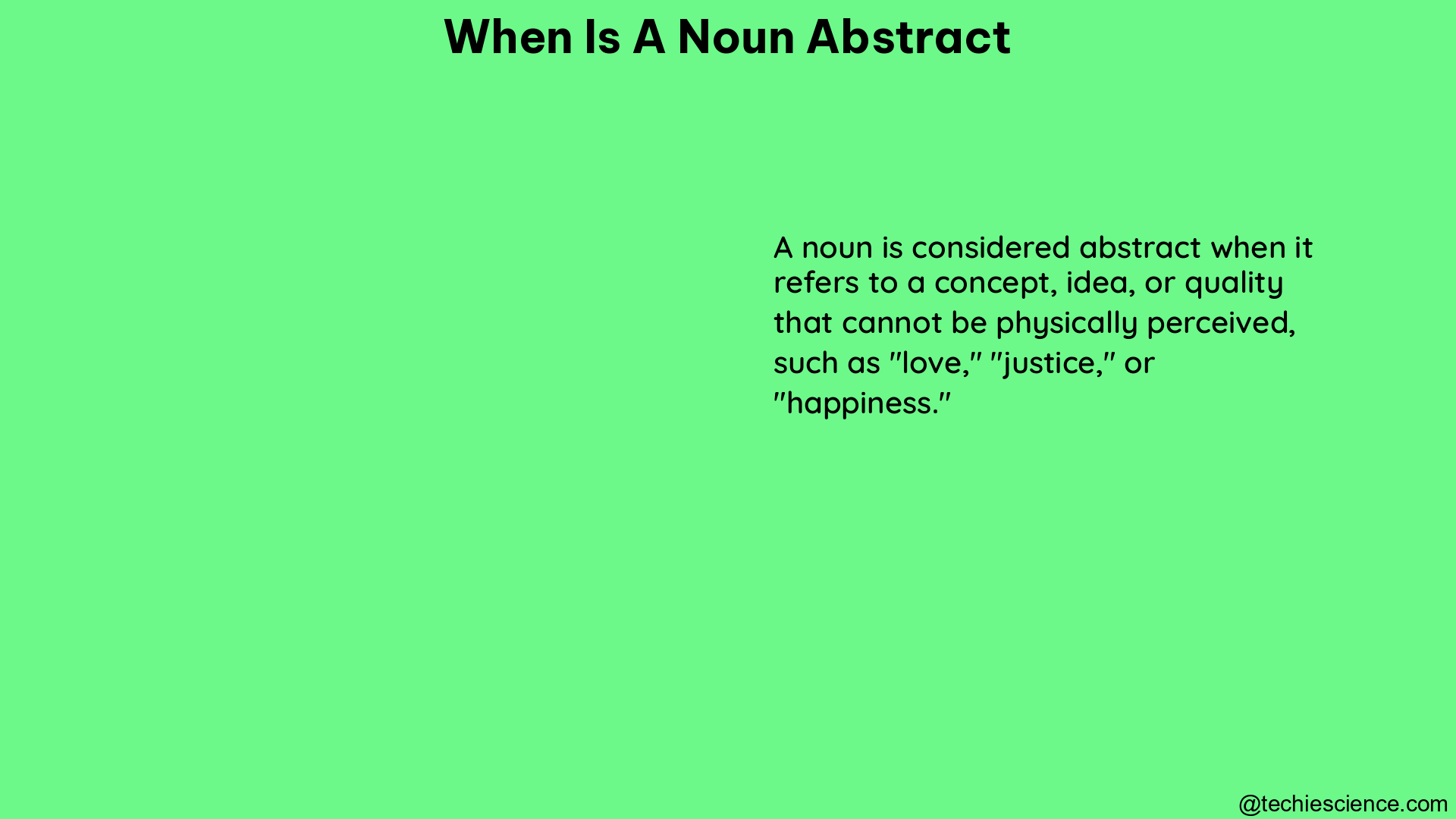A noun is considered abstract when it refers to an intangible concept, idea, emotion, or quality that cannot be perceived directly through the five senses (sight, sound, touch, taste, or smell). Abstract nouns are non-physical and do not have a concrete existence. They are often used to describe feelings, thoughts, and abstract concepts that are not tangible or material.
Definition of an Abstract Noun
An abstract noun is defined as a noun that refers to an idea or a general quality, rather than to a physical object. These nouns are not concrete or tangible and cannot be seen, heard, tasted, smelt, or touched.
Characteristics of Abstract Nouns

Intangible
Abstract nouns are non-physical and cannot be perceived directly through the senses. They do not have a physical form or substance.
Immaterial
Abstract nouns do not have a concrete existence. They are not made of matter and cannot be measured or quantified.
Conceptual
Abstract nouns refer to ideas, thoughts, and abstract concepts that exist in the mind rather than in the physical world.
Non-tangible
Abstract nouns cannot be touched, seen, heard, tasted, or smelled. They are not perceptible to the senses.
Examples of Abstract Nouns
Emotions
- Love
- Happiness
- Sadness
- Anger
- Fear
Concepts
- Freedom
- Justice
- Beauty
- Morality
Personal Qualities
- Courage
- Honesty
- Kindness
- Intelligence
States of Being
- Chaos
- Peace
- Stability
- Existence
Time
- Hour
- Day
- Year
- Century
Philosophical Concepts
- Ethics
- Democracy
- Socialism
- Nihilism
Converting Verbs and Adjectives to Abstract Nouns
Verbs and adjectives can be converted into abstract nouns by adding suffixes such as -ness, -ment, -ity, -ship, -cy, and -ism. Here are some examples:
| Verb/Adjective | Abstract Noun |
|---|---|
| Move | Movement |
| Brave | Bravery |
| Mature | Maturity |
| Govern | Governance |
| Compete | Competition |
| Critic | Criticism |
Differentiating Abstract Nouns from Concrete Nouns
To determine if a noun is abstract or concrete, ask yourself if it can be sensed. If it can be seen, heard, touched, smelled, or tasted, it is a concrete noun. If not, it is an abstract noun.
Concrete nouns refer to physical objects, people, or places that can be perceived through the five senses. They have a tangible existence and can be measured or quantified.
Examples of concrete nouns:
– Apple
– Chair
– Dog
– Mountain
– Book
In contrast, abstract nouns refer to intangible concepts, ideas, emotions, or qualities that cannot be directly perceived through the senses.
Importance of Understanding Abstract Nouns
Understanding the concept of abstract nouns is crucial for effective communication and writing. Abstract nouns are essential in expressing complex ideas, emotions, and philosophical concepts that cannot be easily conveyed through concrete language.
By recognizing and using abstract nouns appropriately, you can:
-
Enhance Descriptive Ability: Abstract nouns allow you to describe intangible qualities, emotions, and concepts with greater precision and depth.
-
Improve Analytical Thinking: Identifying and understanding abstract nouns can help you engage in more nuanced and analytical thinking, as they often represent complex ideas and concepts.
-
Strengthen Persuasive Writing: Abstract nouns can be powerful tools in persuasive writing, as they can appeal to the reader’s emotions, values, and beliefs.
-
Develop Sophisticated Language: Mastering the use of abstract nouns can contribute to the development of a more sophisticated and articulate language, which is essential for academic, professional, and creative writing.
Conclusion
In summary, a noun is considered abstract when it refers to an intangible concept, idea, emotion, or quality that cannot be perceived directly through the five senses. Understanding the characteristics, examples, and importance of abstract nouns is crucial for effective communication, analytical thinking, and the development of sophisticated language skills.
References
- BYJU’S. (n.d.). Abstract Nouns – Definition, Examples and Usage. Retrieved from https://byjus.com/english/abstract-nouns/
- Grammarly. (2022, December 19). Concrete Nouns vs. Abstract Nouns. Retrieved from https://www.grammarly.com/blog/concrete-vs-abstract-nouns/
- Scribbr. (2023, February 25). Abstract Noun | Definition, Examples & Worksheet. Retrieved from https://www.scribbr.com/nouns-and-pronouns/abstract-noun/

Hi! I am Bhabesh Sing. I have completed M.A in English, M.A in Vocal Music, and B.Ed. I am a creative writer. Currently, I am a Subject Matter Expert in English on this Platform.
Let’s connect through LinkedIn-https://www.linkedin.com/in/bhabesh-sing-660914ab